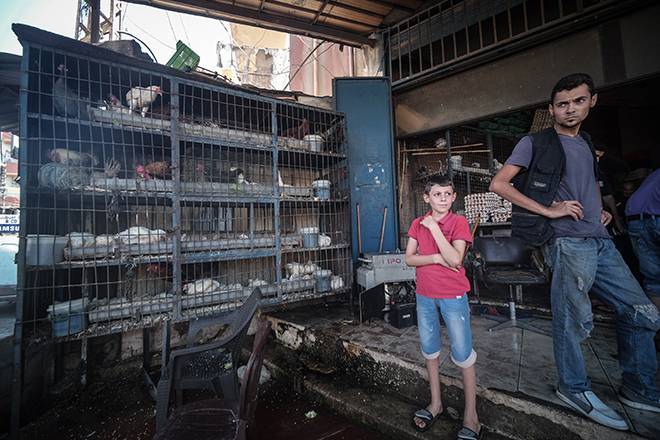
A poultry seller on the Aabdeh-Halba highway in Akkar. A recent study looked into the causes of statelessness in Akkar. (Credit: João Sousa)
BEIRUT — By simplifying and speeding up the late birth registration procedure, Lebanon could address the status of more than half of the country's stateless population, according to a newly released report by Siren, an international not-for-profit company with headquarters in Lebanon that specializes in public sector reform and the United Nations refugee agency.
The study, which was released Friday to coincide with International Human Rights Day, looked into the causes and consequences of statelessness in the marginalized Akkar governorate, conducting 1,102 surveys of stateless adults or parents of stateless children. The research found that 47 percent of stateless people in the area had been born to a Lebanese father but were simply not registered at birth.
The findings come in parallel to Siren’s 2019 study on the issue of statelessness in Tripoli, in which the organization concluded that non-registration is responsible for 63 percent of the city’s cases of statelessness. The stateless population in Tripoli could double in 15 years, the group’s research shows.
Along with streamlining birth registration procedures, the report recommends addressing the causes and consequences of statelessness by “rectifying gaps in nationality laws, acceding to relevant conventions related to statelessness, ensuring that all existing rights for stateless persons are upheld, and using available digital resources to manage and solve all identified cases without delay or discrimination.”
Statelessness has life-impacting consequences for individuals, as having nationality is often a prerequisite for a range of rights, including access to education, employment and health care.
According to the report, Lebanese leaders have politicized statelessness over time by arguing that granting nationality to stateless residents of the country would alter Lebanon’s sectarian demographic balance.
Theodore Caponis, who headed Siren’s studies into the subject in both Tripoli and Akkar, said that the findings of both studies called into question the “hyper sectarianism” of the political rhetoric around statelessness.
“Statelessness should instead be framed as a less politically polarizing human rights issue,” he said in the newly released report.
Labor rights for stateless people in Lebanon were brought forth this week by Labor Minister Mustafa Bayram, who announced Thursday that Palestinian refugees and stateless Lebanese would be granted access to an array of jobs that require syndicate membership.
However the decision was not welcomed by all. Free Patriotic Movement leader Gebran Bassil denounced the decision on Twitter while the Kataeb party released a statement noting that it constitutes an “attack on the right of the Lebanese.”
Syndicates representing pharmacists and physicians also pushed back against Bayram’s decision.
Since Lebanese women don’t have the right to pass their nationality to their children, the children of Lebanese mothers and non-Lebanese fathers can grow up to be stateless too and often face circumstances like difficulty in accessing free primary and secondary education.
On Tuesday, the Parliament was scheduled to discuss a bill submitted by MP George Atallah that would block giving nationality to stateless children born after 2011. Atallah cited the Syrian refugee crisis and fears that refugees might be able to come by forged documents as the reason for the proposal.
While it was ultimately not taken up during the session, if passed, this bill would make it more difficult for Lebanese parents who have not registered their children born after 2011 to seek citizenship for them.